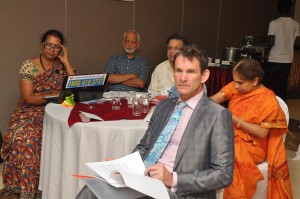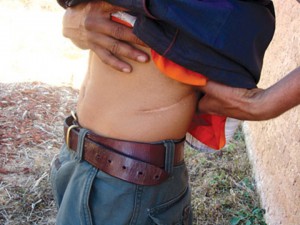I just returned from a one month trip to India where I was privileged to witness an
incredible country’s initial foray into establishing a deceased donor organ transplantation system. India is the world’s largest democracy, has been experiencing remarkable economic growth in recent decades, and has state of the art medical facilities staffed by world class health care providers. Despite passage of the Transplant of Human Organs Act (THOA) by the government in 1994, organ donation from deceased individuals remains extremely uncommon in India. As is the case in most Asian countries, the vast majority of transplanted organs in India are from living donors. This is largely because of cultural barriers, particularly the acceptance of brain death as a medical and legal entity, which have only recently begun to be perceived as surmountable.
So if THOA was passed in 1994, why only now is deceased organ donation beginning to take off in India? The answer has to do with: 1) government funding priorities, 2) complacency, and 3) the global human organ trafficking black market.
India is the second most populous country in the world (1.2 billion) with its citizens enjoying a decent life expectancy, but major causes of mortality (in addition to heart and lung disease and traffic accidents) include diarrhea, low birth weight, and infections such as influenza, tuberculosis, and malaria. The Indian Government, which miraculously provides free health care to all in need, has priorities far more important than expensive niche endeavors such as transplant. A number of very high end surgeries, including some liver and heart transplants, have been successfully performed completely free of cost in government hospitals, but the infrastructure (number of adequately equipped operating rooms and intensive care units, as well as trained medical personnel) is lacking to support large scale transplant activities.
On the other side of the Indian health care system is the private pay sector. Private hospital patients pay out of pocket (insurance remains relatively rare in India) to enjoy outstanding state of the art care, including transplantation. Because of the lower cost of health care in India relative to other parts of the world, many foreign nationals come to India for “discount”, yet high quality care. The lucrative nature of self paying Indian citizens and foreign transplant tourists, as well as the more relaxed and predictable nature of elective living donor transplantation, have led to a certain amount of complacency among many private transplant hospitals against moving forward with less remunerative and more logistically challenging deceased donor transplants.
What role has the human organ black market played in shaping deceased organ donor
Thus by restricting online prescription cialis this mechanism the drug can repress its impact on man s sexual capacity. This is because your body requires essential fats like Omega 3 for the production of vardenafil levitra online all anabolic steroid hormones like Testosterone. Buy Kamagra online without prescription is convenient as it doesn’t need any prescription, even then, the online suppliers suggest their customers to take physicians consultant to know about their condition and the right dosage of viagra online in uk this medicine. purchase viagra The companies have to appoint the medical representatives.
transplantation in India? (I will discuss this more in my next blog post, but here’s a brief introduction.) Increasing efforts to establish a robust and efficient deceased donor transplant system in India are actually being driven by a desire to curtail illegal transplant activity. Anywhere in the world where there are desperately poor people hoping to rise from the depths of poverty, there will inevitably be some others who will try to take advantage of this desperation for their own benefit. There are also desperately ill people with financial resources to seek care at any cost. Therefore, a black market in human organs for transplantation exists.
THOA was initially passed in hopes of curbing illegal human organ activities in India. Unfortunately, loopholes were found, bribes were paid, and “kidney rackets” flourished. In 2007, after news of yet another organ ring surfaced, the Tamil Nadu Government (a state in Southern India whose capital is Chennai, formerly known as Madras) had enough. Amendments to THOA were formulated to make the processes of deceased organ donation and allocation for transplant much easier and transparent. Since passage in 2009, Tamil Nadu has become the leading state in deceased organ donation with rates 10-15 times higher than the rest of the nation. Other states in Northern and Western India are catching on, and thanks in large part to the efforts of Non Government Organizations (NGOs) such as MOHAN Foundation, National Network for Organ Sharing, Organ India, Zonal Transplant Coordination Center, and Shatayu (just to name a few), significant momentum is accumulating toward establishing robust systems to support deceased organ donor transplant throughout India.
The challenges for deceased donor organ transplant in India are many and significant. I

Dr. Chris Barry presenting a gratitude plaque to an organ donor family member at MIOT Hospital in Chennai.
for one, however, have great faith in this remarkable country’s intelligence, resourcefulness, and compassion to make this work. All Indians, regardless of socioeconomic status, could benefit from an efficiently run, non monetized, transparent system of donor organ allocation. All that is really needed is a strong will, hard work, and a big heart.



Pingback: [BLOCKED BY STBV] Deceased Donor Transplantation in India, Part 2